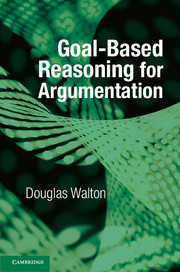Book contents
- Frontmatter
- Dedication
- Contents
- Acknowledgments
- 1 Introduction to Practical Reasoning
- 2 Practical Reasoning in Health Product Ads
- 3 Formal and Computational Systems of Practical Reasoning
- 4 Practical Reasoning in Arguments and Explanations
- 5 Explanations, Motives, and Intentions
- 6 Practical Argumentation in Deliberation Dialogue
- 7 Goal-Based Argumentation in Different Types of Dialogue
- 8 Practical and Epistemic Rationality
- Bibliography
- Index
8 - Practical and Epistemic Rationality
Published online by Cambridge University Press: 05 November 2015
- Frontmatter
- Dedication
- Contents
- Acknowledgments
- 1 Introduction to Practical Reasoning
- 2 Practical Reasoning in Health Product Ads
- 3 Formal and Computational Systems of Practical Reasoning
- 4 Practical Reasoning in Arguments and Explanations
- 5 Explanations, Motives, and Intentions
- 6 Practical Argumentation in Deliberation Dialogue
- 7 Goal-Based Argumentation in Different Types of Dialogue
- 8 Practical and Epistemic Rationality
- Bibliography
- Index
Summary
This chapter discusses the theoretical questions that are raised as one navigates across the storm-tossed seas of philosophical controversies about rationality. The analysis of the structure of practical reasoning advanced in the previous chapters has raised the question of whether it can be used to frame a new philosophical definition of rationality, but it also poses some problems. One of them is how to define the other kind of rationality that is apparently left over once practical reasoning has been shown to represent some notion of practical rationality. Some (pragmatists) think that nothing is left over, and that all rationality is practical rationality. Some call what is left over theoretical rationality, while others call it epistemic rationality.
The four examples of the use of practical reasoning in deliberation studied in Chapter 6 showed that intelligent deliberation needs to be based on knowledge of the circumstances of the case that is continually streaming in to an agent (or group of them) from an open knowledge base. This view of how practical reasoning is used requires a different approach to the notions of epistemic and practical rationality. The two notions need to be defined separately as distinctive concepts, but they also need to be seen as concepts that are combined in practical reasoning. Practical reasoning needs to be based on an agent's goals and values, but also on its knowledge of the circumstances. However, because the circumstances are continually changing, both human and machine agents, even when working together, are fallible. This means we are continually subject to bias, misperceptions, and errors of judgment. As we saw when defining the list of characteristics of a rational agent, one of the most important characteristics is the capability for error correction based on feedback as new information streams into the agent's knowledge base.
The central feature of knowledge in this view is that it has to be based on evidence, rather than requiring the truth of its findings.
- Type
- Chapter
- Information
- Goal-based Reasoning for Argumentation , pp. 234 - 274Publisher: Cambridge University PressPrint publication year: 2015



